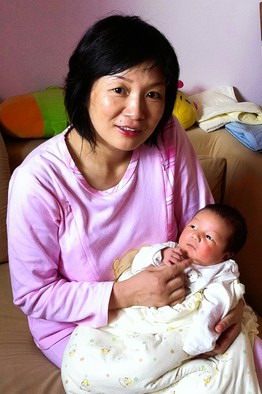June 25, 2011
HONG KONG¡XThe Hong Kong government moved to limit the number of Hong Kong births by mothers from China next year, as pregnant Chinese women flooding into Hong Kong from China to evade the one-child policy have strained the capacity of the health-care system in Hong Kong.
Public hospitals in Hong Kong will set aside 3,400 spaces for Chinese mothers, but are supposed to accept bookings from non-locals only when there is spare capacity. Ten private hospitals have agreed to provide a total of 31,000 additional spaces. The total number of spaces would represent a 7% decrease from the expected tally of Chinese births for this year.
Of the roughly 88,000 babies born in Hong Kong last year, about 45% were the children of Chinese women. For the growing ranks of well-heeled Chinese parents, the math and the logic of a Hong Kong delivery are simple. A Hong Kong delivery entitles their child to rights of abode and education in Hong Kong. Also, in China, violating the country's one-child policy can result in a fine equal to several times annual income. Because, Hong Kong, a former British colony, operates under a separate legal system after being annexed by China in 1997. China's one-child policies don't apply to Hong Kong.
As mentioned earlier, any baby born to a Chinese mother in Hong Kong automatically gains local residency rights. Although Chinese women often bring their children back to China after giving birth, those children are free at a later date to move to Hong Kong, where people enjoy legal and political protections unavailable to their countrymen in China.
Public hospitals in Hong Kong have been giving priority to Hong Kong mothers for several years. In 2010 the number of foreign women giving birth in local hospitals was restricted to 9,899.
Hong Kong has now become so popular among pregnant Chinese women from across the border that Hong Kong people say they have been squeezed out of hospital spaces. Doctors and nurses are also complaining about being overburdened by the extra demand.
Loletta So, head of the Hong Kong Public Doctors Association, said the group believed the restricted number of Chinese births was manageable, and supported the government's measures.
Mei Ting, a 39-year-old advertising executive from Shanghai, China came to Hong Kong last month to have her second child, a boy. She paid US$11,600 to an agency based in the border city of Shenzhen to secure a spot at Hong Kong's private Baptist Hospital. The 12-day package included two visits from Shenzhen to Hong Kong, for a check-up and the delivery. After a caesarean section, Ms. Mei spent three nights in the hospital, and divided the rest of her time resting in apartments rented by the agency in Hong Kong and Shenzhen.

Chinese mother Mei Ting, with her Hong Kong-born baby boy.
"I think the price is very reasonable," said Ms. Mei, "as you would end up getting fined that much money for having more than one child in China anyway." The fine varies across different localities in China.
But many in Hong Kong are irate that local mothers are being marginalized from the health-care system.
When Hong Kong resident Elaine Chan's water broke one night last October, she called Matilda International Hospital¡Xwhere she had paid a deposit of about US$2,600, or around $20,000 Hong Kong dollars¡Xto say she was on the way, but the response she received was simply: "Don't come."
The day happened to be a numerically auspicious day for many Chinese¡XOctober 10, 2010, or "10-10-10." Ms. Chan secured a spot at another "really old, run-down hospital" where she gave birth to a baby girl, but said, "I just couldn't get over the fact that I was booted out after having paid for the deposit."
Belinda Chun, a spokeswoman at Matilda Hospital, said the reason Ms. Chan wasn't admitted wasn't a flood of Chinese patients. "None of our patients in our maternity ward at the time were from China," she said. "The only time we do not admit patients is when this may compromise the level of care we can offer to any of our patients."
She said, "Our guiding principle is to serve our local mothers first and foremost." She said the share of Chinese mothers in the hospital is "quite constant, hovering around 5%" a year.
While the new caps may reduce the number of Chinese women who book hospital spots ahead of time, it doesn't address Chinese women who show up at emergency rooms, where they may gain admission even if they haven't booked a hospital space.
"In August, many Chinese women rush to the emergency room at any time of day and say they're experiencing pain and demand a C-section," placing a huge strain on the hospital, said Wendy Shu, a first-year obstetrics resident in a public hospital in Hong Kong. She is bracing herself for the peak month of August, as eight is an auspicious number in China.
Ironically, for Hong Kong, babies born to Chinese mothers could be the key to sustaining the city's future economic growth, because of Hong Kong's extremely low birth rate¡Xin 2010, the fertility rate was 0.9, according to Hong Kong government data. The replacement rate is generally considered to be 2.1. According to Dr. Shu, the majority of births at her hospital this year have been from Chinese women.
"We can't rely on locals to give birth," she said. "They just don't have children."